Global Crime: The Economics and Impact of Big Tobacco Smuggling
VerifiedAdded on 2023/06/05
|10
|2691
|359
Report
AI Summary
This report delves into the pervasive issue of big tobacco smuggling, highlighting its connections to organized crime, tax evasion, and global market manipulation. It examines how major tobacco companies like Philip Morris and British American Tobacco (BAT) have been implicated in smugglin...
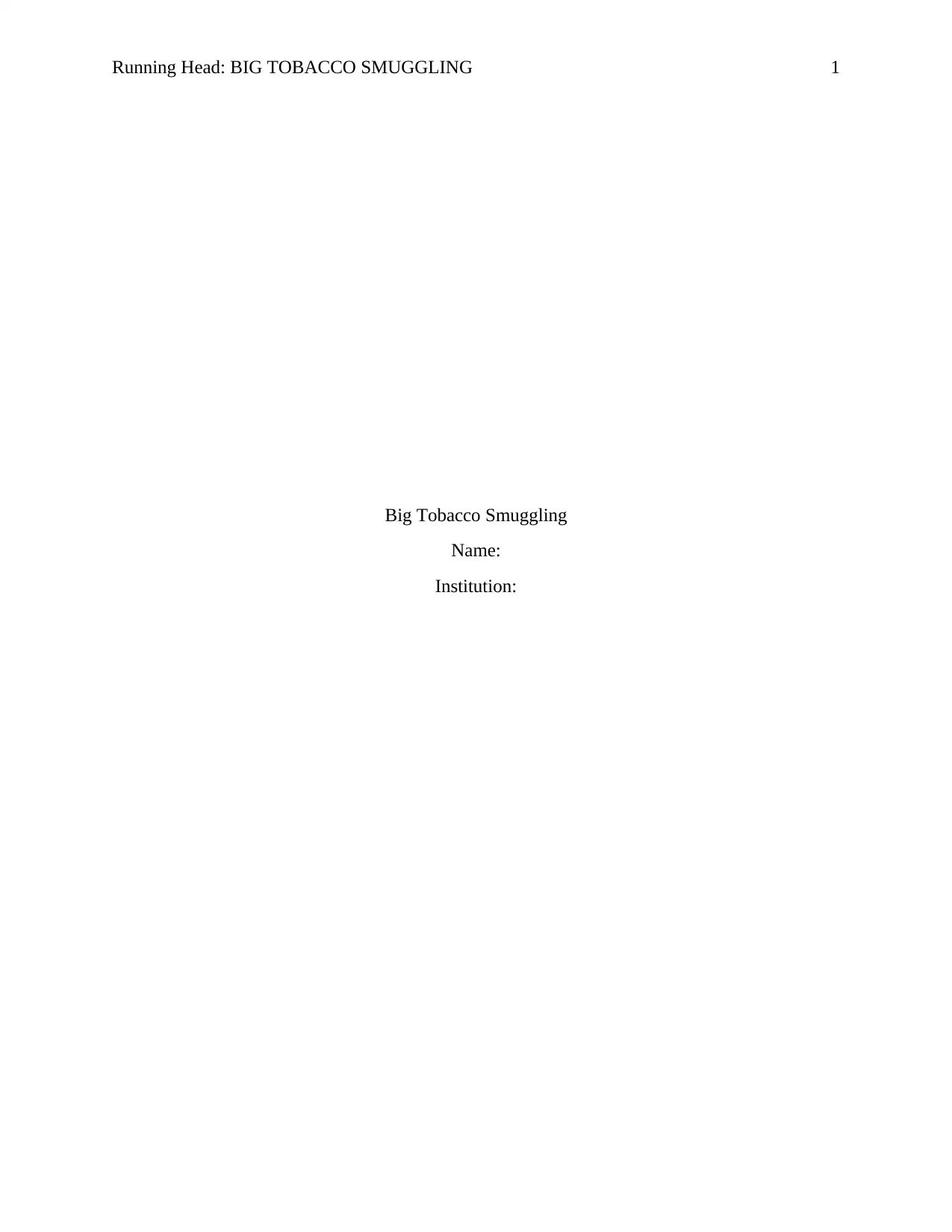
Running Head: BIG TOBACCO SMUGGLING 1
Big Tobacco Smuggling
Name:
Institution:
Big Tobacco Smuggling
Name:
Institution:
Paraphrase This Document
Need a fresh take? Get an instant paraphrase of this document with our AI Paraphraser
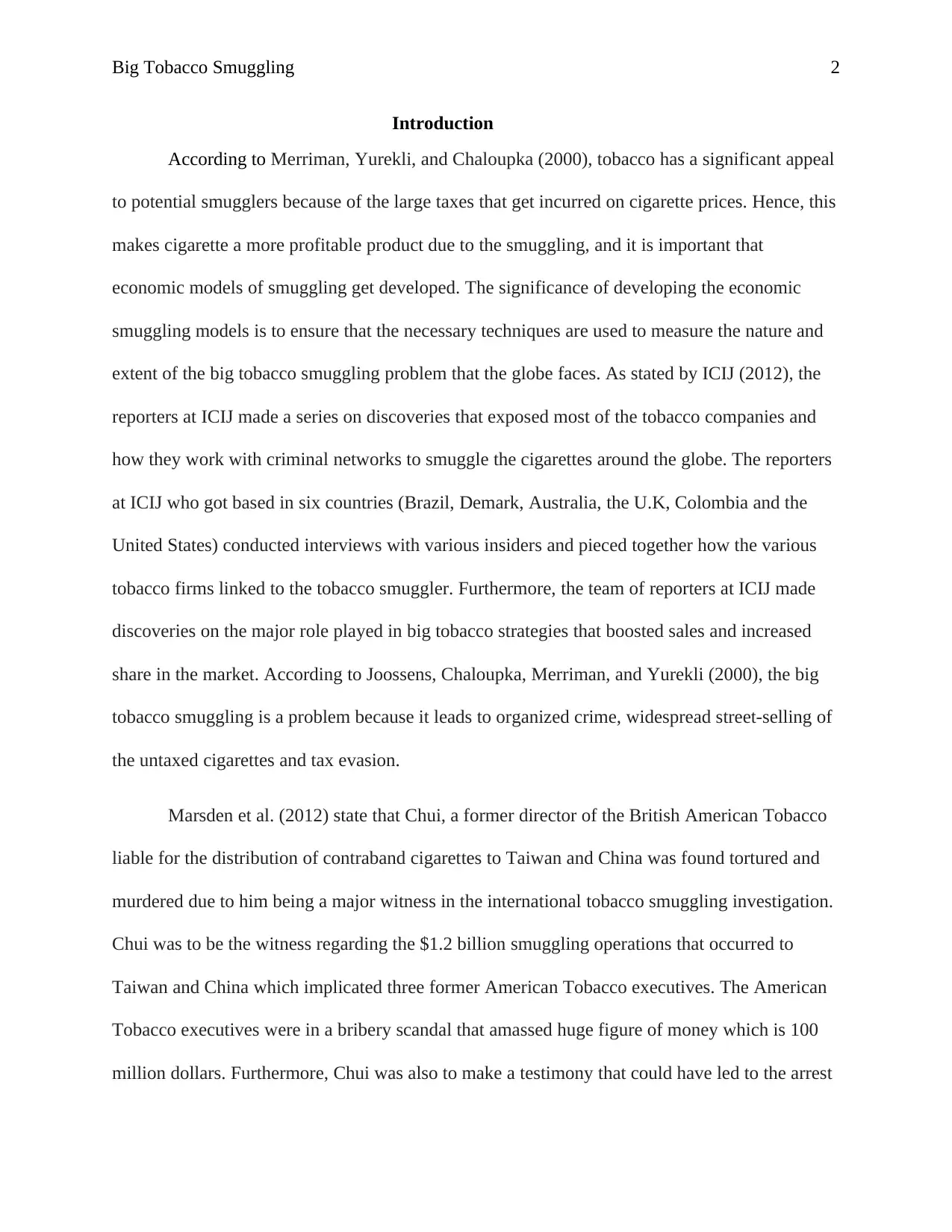
Big Tobacco Smuggling 2
Introduction
According to Merriman, Yurekli, and Chaloupka (2000), tobacco has a significant appeal
to potential smugglers because of the large taxes that get incurred on cigarette prices. Hence, this
makes cigarette a more profitable product due to the smuggling, and it is important that
economic models of smuggling get developed. The significance of developing the economic
smuggling models is to ensure that the necessary techniques are used to measure the nature and
extent of the big tobacco smuggling problem that the globe faces. As stated by ICIJ (2012), the
reporters at ICIJ made a series on discoveries that exposed most of the tobacco companies and
how they work with criminal networks to smuggle the cigarettes around the globe. The reporters
at ICIJ who got based in six countries (Brazil, Demark, Australia, the U.K, Colombia and the
United States) conducted interviews with various insiders and pieced together how the various
tobacco firms linked to the tobacco smuggler. Furthermore, the team of reporters at ICIJ made
discoveries on the major role played in big tobacco strategies that boosted sales and increased
share in the market. According to Joossens, Chaloupka, Merriman, and Yurekli (2000), the big
tobacco smuggling is a problem because it leads to organized crime, widespread street-selling of
the untaxed cigarettes and tax evasion.
Marsden et al. (2012) state that Chui, a former director of the British American Tobacco
liable for the distribution of contraband cigarettes to Taiwan and China was found tortured and
murdered due to him being a major witness in the international tobacco smuggling investigation.
Chui was to be the witness regarding the $1.2 billion smuggling operations that occurred to
Taiwan and China which implicated three former American Tobacco executives. The American
Tobacco executives were in a bribery scandal that amassed huge figure of money which is 100
million dollars. Furthermore, Chui was also to make a testimony that could have led to the arrest
Introduction
According to Merriman, Yurekli, and Chaloupka (2000), tobacco has a significant appeal
to potential smugglers because of the large taxes that get incurred on cigarette prices. Hence, this
makes cigarette a more profitable product due to the smuggling, and it is important that
economic models of smuggling get developed. The significance of developing the economic
smuggling models is to ensure that the necessary techniques are used to measure the nature and
extent of the big tobacco smuggling problem that the globe faces. As stated by ICIJ (2012), the
reporters at ICIJ made a series on discoveries that exposed most of the tobacco companies and
how they work with criminal networks to smuggle the cigarettes around the globe. The reporters
at ICIJ who got based in six countries (Brazil, Demark, Australia, the U.K, Colombia and the
United States) conducted interviews with various insiders and pieced together how the various
tobacco firms linked to the tobacco smuggler. Furthermore, the team of reporters at ICIJ made
discoveries on the major role played in big tobacco strategies that boosted sales and increased
share in the market. According to Joossens, Chaloupka, Merriman, and Yurekli (2000), the big
tobacco smuggling is a problem because it leads to organized crime, widespread street-selling of
the untaxed cigarettes and tax evasion.
Marsden et al. (2012) state that Chui, a former director of the British American Tobacco
liable for the distribution of contraband cigarettes to Taiwan and China was found tortured and
murdered due to him being a major witness in the international tobacco smuggling investigation.
Chui was to be the witness regarding the $1.2 billion smuggling operations that occurred to
Taiwan and China which implicated three former American Tobacco executives. The American
Tobacco executives were in a bribery scandal that amassed huge figure of money which is 100
million dollars. Furthermore, Chui was also to make a testimony that could have led to the arrest
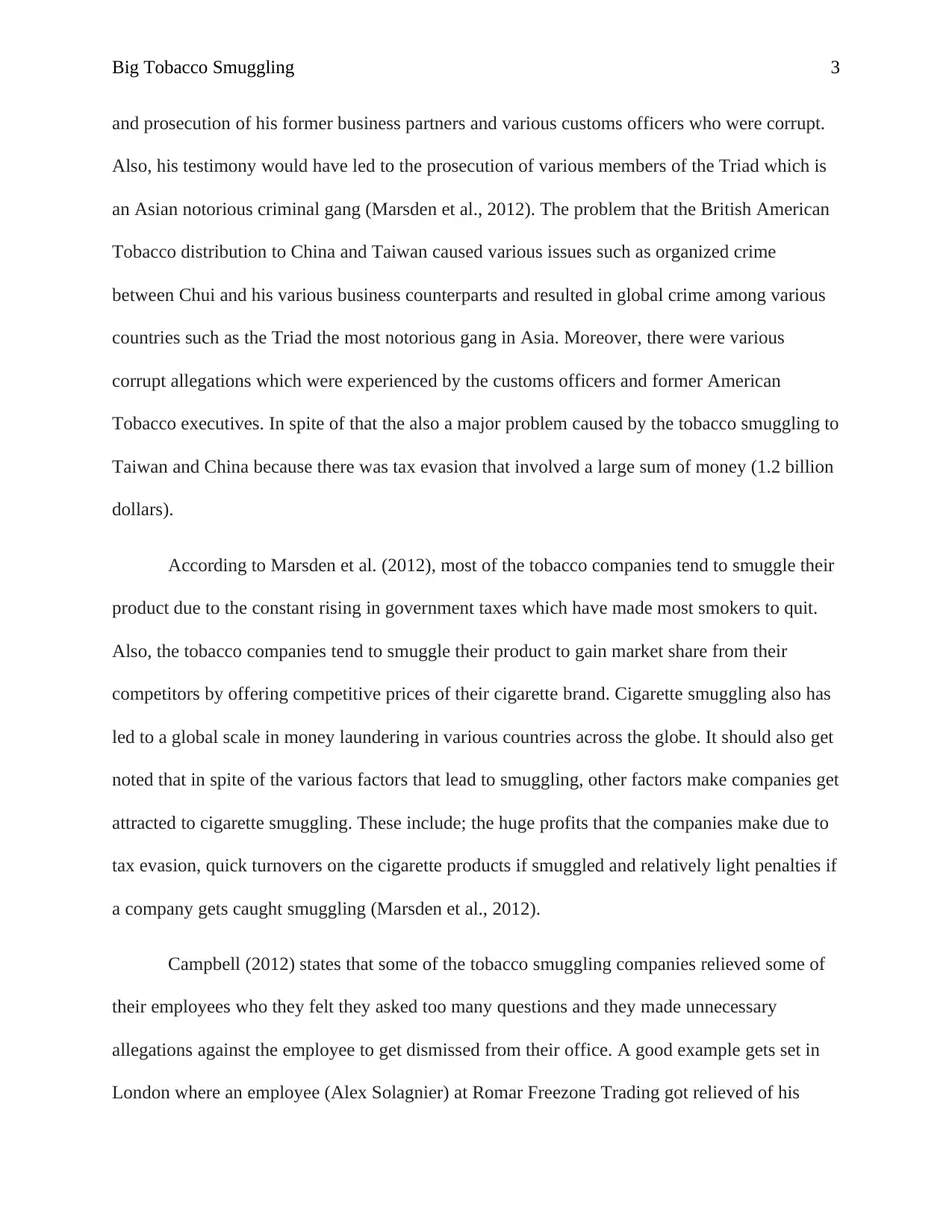
Big Tobacco Smuggling 3
and prosecution of his former business partners and various customs officers who were corrupt.
Also, his testimony would have led to the prosecution of various members of the Triad which is
an Asian notorious criminal gang (Marsden et al., 2012). The problem that the British American
Tobacco distribution to China and Taiwan caused various issues such as organized crime
between Chui and his various business counterparts and resulted in global crime among various
countries such as the Triad the most notorious gang in Asia. Moreover, there were various
corrupt allegations which were experienced by the customs officers and former American
Tobacco executives. In spite of that the also a major problem caused by the tobacco smuggling to
Taiwan and China because there was tax evasion that involved a large sum of money (1.2 billion
dollars).
According to Marsden et al. (2012), most of the tobacco companies tend to smuggle their
product due to the constant rising in government taxes which have made most smokers to quit.
Also, the tobacco companies tend to smuggle their product to gain market share from their
competitors by offering competitive prices of their cigarette brand. Cigarette smuggling also has
led to a global scale in money laundering in various countries across the globe. It should also get
noted that in spite of the various factors that lead to smuggling, other factors make companies get
attracted to cigarette smuggling. These include; the huge profits that the companies make due to
tax evasion, quick turnovers on the cigarette products if smuggled and relatively light penalties if
a company gets caught smuggling (Marsden et al., 2012).
Campbell (2012) states that some of the tobacco smuggling companies relieved some of
their employees who they felt they asked too many questions and they made unnecessary
allegations against the employee to get dismissed from their office. A good example gets set in
London where an employee (Alex Solagnier) at Romar Freezone Trading got relieved of his
and prosecution of his former business partners and various customs officers who were corrupt.
Also, his testimony would have led to the prosecution of various members of the Triad which is
an Asian notorious criminal gang (Marsden et al., 2012). The problem that the British American
Tobacco distribution to China and Taiwan caused various issues such as organized crime
between Chui and his various business counterparts and resulted in global crime among various
countries such as the Triad the most notorious gang in Asia. Moreover, there were various
corrupt allegations which were experienced by the customs officers and former American
Tobacco executives. In spite of that the also a major problem caused by the tobacco smuggling to
Taiwan and China because there was tax evasion that involved a large sum of money (1.2 billion
dollars).
According to Marsden et al. (2012), most of the tobacco companies tend to smuggle their
product due to the constant rising in government taxes which have made most smokers to quit.
Also, the tobacco companies tend to smuggle their product to gain market share from their
competitors by offering competitive prices of their cigarette brand. Cigarette smuggling also has
led to a global scale in money laundering in various countries across the globe. It should also get
noted that in spite of the various factors that lead to smuggling, other factors make companies get
attracted to cigarette smuggling. These include; the huge profits that the companies make due to
tax evasion, quick turnovers on the cigarette products if smuggled and relatively light penalties if
a company gets caught smuggling (Marsden et al., 2012).
Campbell (2012) states that some of the tobacco smuggling companies relieved some of
their employees who they felt they asked too many questions and they made unnecessary
allegations against the employee to get dismissed from their office. A good example gets set in
London where an employee (Alex Solagnier) at Romar Freezone Trading got relieved of his
⊘ This is a preview!⊘
Do you want full access?
Subscribe today to unlock all pages.

Trusted by 1+ million students worldwide
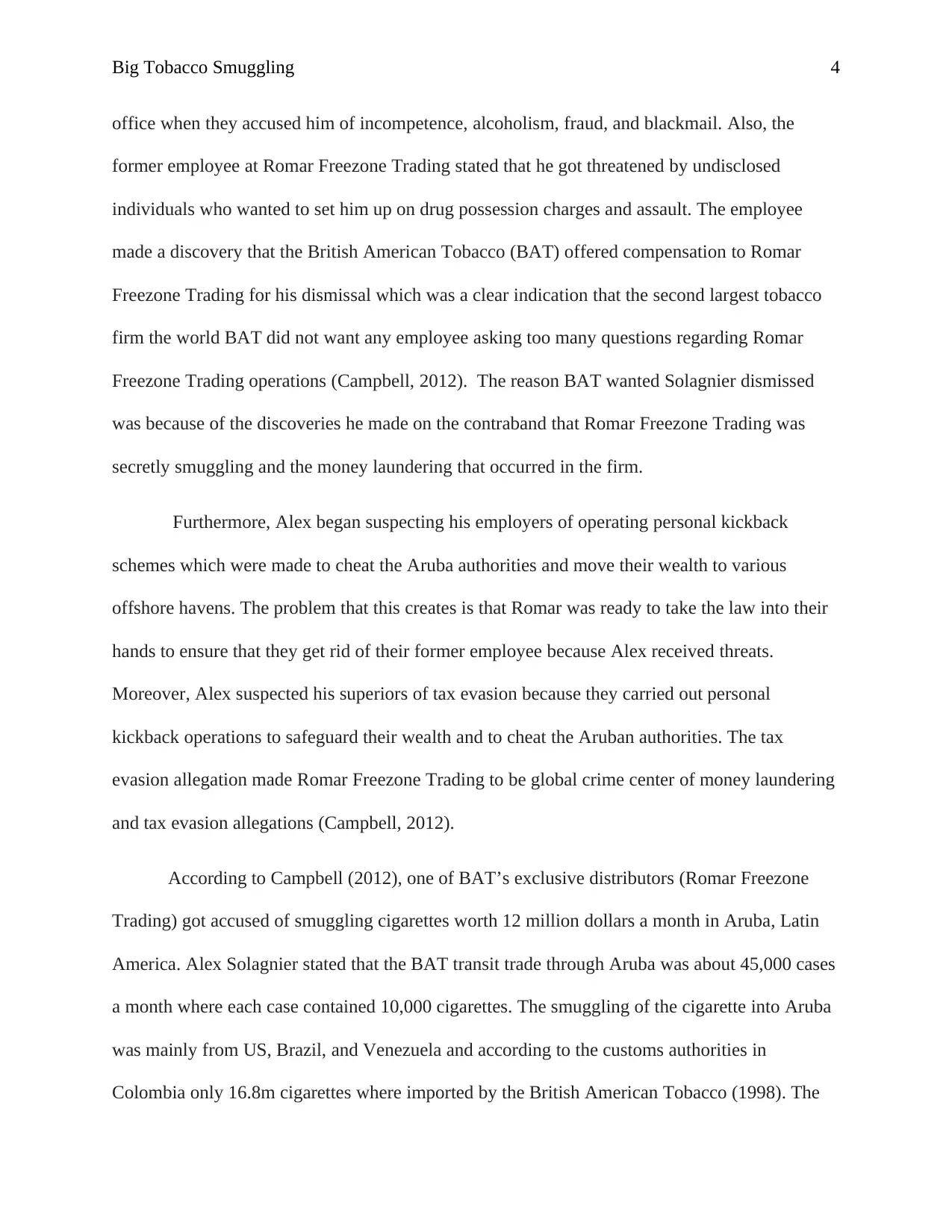
Big Tobacco Smuggling 4
office when they accused him of incompetence, alcoholism, fraud, and blackmail. Also, the
former employee at Romar Freezone Trading stated that he got threatened by undisclosed
individuals who wanted to set him up on drug possession charges and assault. The employee
made a discovery that the British American Tobacco (BAT) offered compensation to Romar
Freezone Trading for his dismissal which was a clear indication that the second largest tobacco
firm the world BAT did not want any employee asking too many questions regarding Romar
Freezone Trading operations (Campbell, 2012). The reason BAT wanted Solagnier dismissed
was because of the discoveries he made on the contraband that Romar Freezone Trading was
secretly smuggling and the money laundering that occurred in the firm.
Furthermore, Alex began suspecting his employers of operating personal kickback
schemes which were made to cheat the Aruba authorities and move their wealth to various
offshore havens. The problem that this creates is that Romar was ready to take the law into their
hands to ensure that they get rid of their former employee because Alex received threats.
Moreover, Alex suspected his superiors of tax evasion because they carried out personal
kickback operations to safeguard their wealth and to cheat the Aruban authorities. The tax
evasion allegation made Romar Freezone Trading to be global crime center of money laundering
and tax evasion allegations (Campbell, 2012).
According to Campbell (2012), one of BAT’s exclusive distributors (Romar Freezone
Trading) got accused of smuggling cigarettes worth 12 million dollars a month in Aruba, Latin
America. Alex Solagnier stated that the BAT transit trade through Aruba was about 45,000 cases
a month where each case contained 10,000 cigarettes. The smuggling of the cigarette into Aruba
was mainly from US, Brazil, and Venezuela and according to the customs authorities in
Colombia only 16.8m cigarettes where imported by the British American Tobacco (1998). The
office when they accused him of incompetence, alcoholism, fraud, and blackmail. Also, the
former employee at Romar Freezone Trading stated that he got threatened by undisclosed
individuals who wanted to set him up on drug possession charges and assault. The employee
made a discovery that the British American Tobacco (BAT) offered compensation to Romar
Freezone Trading for his dismissal which was a clear indication that the second largest tobacco
firm the world BAT did not want any employee asking too many questions regarding Romar
Freezone Trading operations (Campbell, 2012). The reason BAT wanted Solagnier dismissed
was because of the discoveries he made on the contraband that Romar Freezone Trading was
secretly smuggling and the money laundering that occurred in the firm.
Furthermore, Alex began suspecting his employers of operating personal kickback
schemes which were made to cheat the Aruba authorities and move their wealth to various
offshore havens. The problem that this creates is that Romar was ready to take the law into their
hands to ensure that they get rid of their former employee because Alex received threats.
Moreover, Alex suspected his superiors of tax evasion because they carried out personal
kickback operations to safeguard their wealth and to cheat the Aruban authorities. The tax
evasion allegation made Romar Freezone Trading to be global crime center of money laundering
and tax evasion allegations (Campbell, 2012).
According to Campbell (2012), one of BAT’s exclusive distributors (Romar Freezone
Trading) got accused of smuggling cigarettes worth 12 million dollars a month in Aruba, Latin
America. Alex Solagnier stated that the BAT transit trade through Aruba was about 45,000 cases
a month where each case contained 10,000 cigarettes. The smuggling of the cigarette into Aruba
was mainly from US, Brazil, and Venezuela and according to the customs authorities in
Colombia only 16.8m cigarettes where imported by the British American Tobacco (1998). The
Paraphrase This Document
Need a fresh take? Get an instant paraphrase of this document with our AI Paraphraser
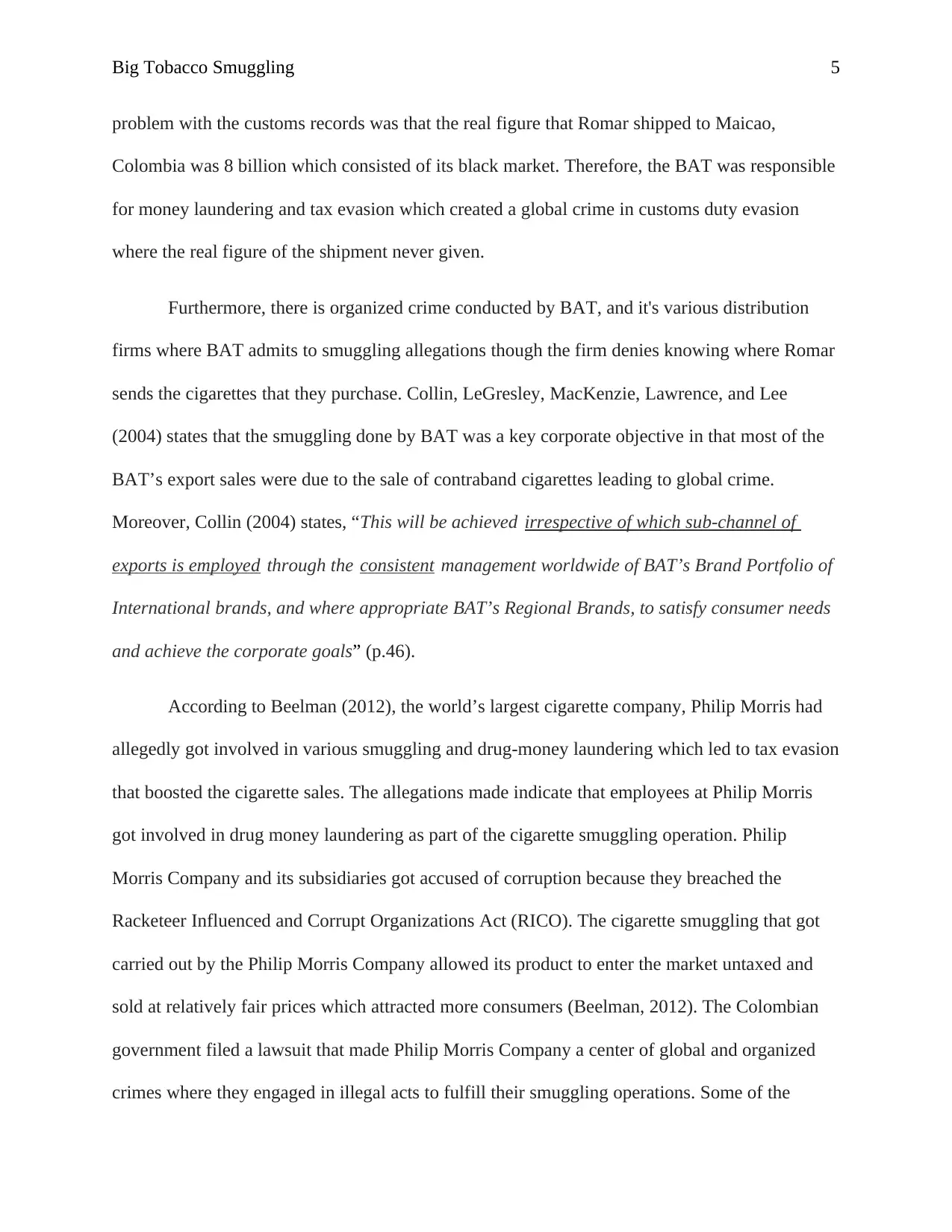
Big Tobacco Smuggling 5
problem with the customs records was that the real figure that Romar shipped to Maicao,
Colombia was 8 billion which consisted of its black market. Therefore, the BAT was responsible
for money laundering and tax evasion which created a global crime in customs duty evasion
where the real figure of the shipment never given.
Furthermore, there is organized crime conducted by BAT, and it's various distribution
firms where BAT admits to smuggling allegations though the firm denies knowing where Romar
sends the cigarettes that they purchase. Collin, LeGresley, MacKenzie, Lawrence, and Lee
(2004) states that the smuggling done by BAT was a key corporate objective in that most of the
BAT’s export sales were due to the sale of contraband cigarettes leading to global crime.
Moreover, Collin (2004) states, “This will be achieved irrespective of which sub-channel of
exports is employed through the consistent management worldwide of BAT’s Brand Portfolio of
International brands, and where appropriate BAT’s Regional Brands, to satisfy consumer needs
and achieve the corporate goals” (p.46).
According to Beelman (2012), the world’s largest cigarette company, Philip Morris had
allegedly got involved in various smuggling and drug-money laundering which led to tax evasion
that boosted the cigarette sales. The allegations made indicate that employees at Philip Morris
got involved in drug money laundering as part of the cigarette smuggling operation. Philip
Morris Company and its subsidiaries got accused of corruption because they breached the
Racketeer Influenced and Corrupt Organizations Act (RICO). The cigarette smuggling that got
carried out by the Philip Morris Company allowed its product to enter the market untaxed and
sold at relatively fair prices which attracted more consumers (Beelman, 2012). The Colombian
government filed a lawsuit that made Philip Morris Company a center of global and organized
crimes where they engaged in illegal acts to fulfill their smuggling operations. Some of the
problem with the customs records was that the real figure that Romar shipped to Maicao,
Colombia was 8 billion which consisted of its black market. Therefore, the BAT was responsible
for money laundering and tax evasion which created a global crime in customs duty evasion
where the real figure of the shipment never given.
Furthermore, there is organized crime conducted by BAT, and it's various distribution
firms where BAT admits to smuggling allegations though the firm denies knowing where Romar
sends the cigarettes that they purchase. Collin, LeGresley, MacKenzie, Lawrence, and Lee
(2004) states that the smuggling done by BAT was a key corporate objective in that most of the
BAT’s export sales were due to the sale of contraband cigarettes leading to global crime.
Moreover, Collin (2004) states, “This will be achieved irrespective of which sub-channel of
exports is employed through the consistent management worldwide of BAT’s Brand Portfolio of
International brands, and where appropriate BAT’s Regional Brands, to satisfy consumer needs
and achieve the corporate goals” (p.46).
According to Beelman (2012), the world’s largest cigarette company, Philip Morris had
allegedly got involved in various smuggling and drug-money laundering which led to tax evasion
that boosted the cigarette sales. The allegations made indicate that employees at Philip Morris
got involved in drug money laundering as part of the cigarette smuggling operation. Philip
Morris Company and its subsidiaries got accused of corruption because they breached the
Racketeer Influenced and Corrupt Organizations Act (RICO). The cigarette smuggling that got
carried out by the Philip Morris Company allowed its product to enter the market untaxed and
sold at relatively fair prices which attracted more consumers (Beelman, 2012). The Colombian
government filed a lawsuit that made Philip Morris Company a center of global and organized
crimes where they engaged in illegal acts to fulfill their smuggling operations. Some of the
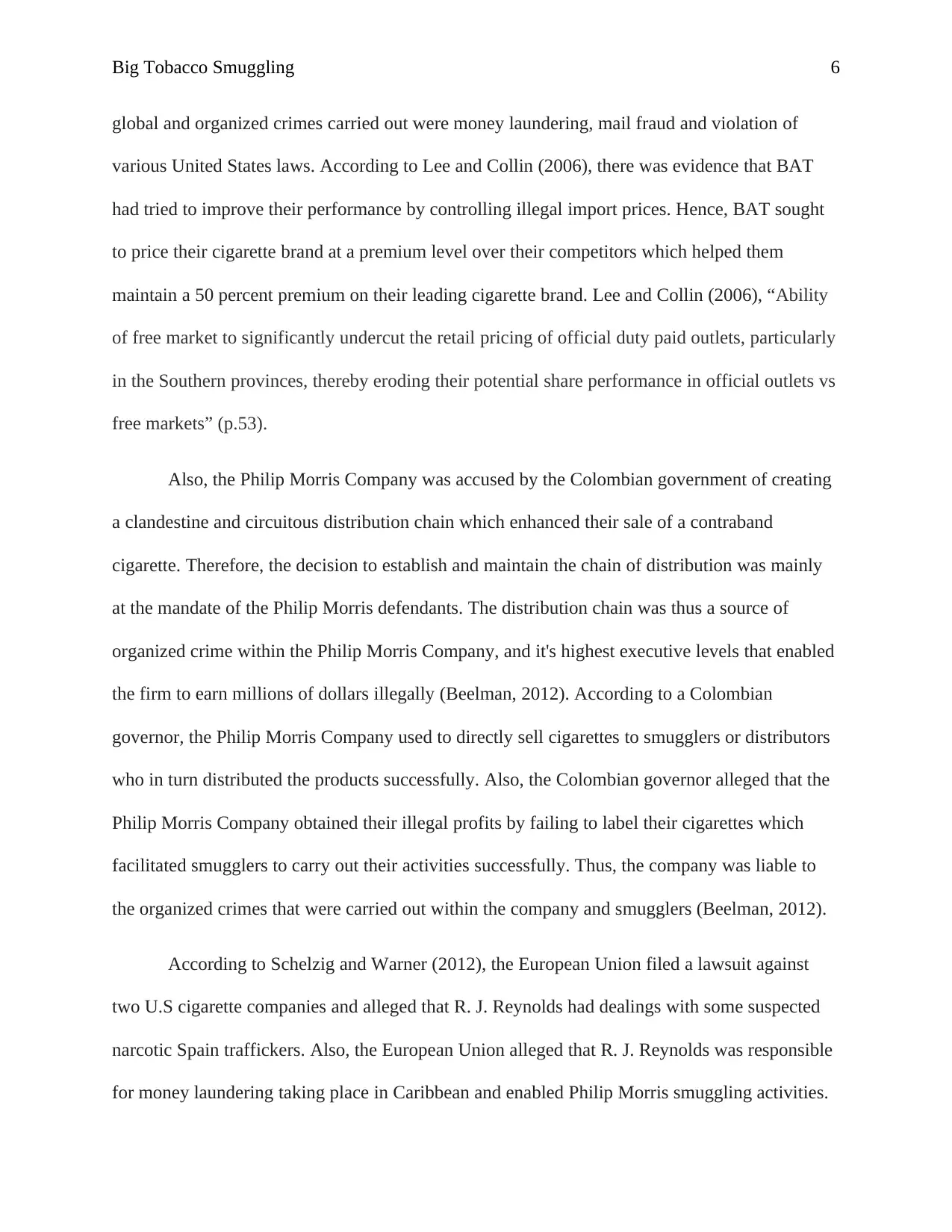
Big Tobacco Smuggling 6
global and organized crimes carried out were money laundering, mail fraud and violation of
various United States laws. According to Lee and Collin (2006), there was evidence that BAT
had tried to improve their performance by controlling illegal import prices. Hence, BAT sought
to price their cigarette brand at a premium level over their competitors which helped them
maintain a 50 percent premium on their leading cigarette brand. Lee and Collin (2006), “Ability
of free market to significantly undercut the retail pricing of official duty paid outlets, particularly
in the Southern provinces, thereby eroding their potential share performance in official outlets vs
free markets” (p.53).
Also, the Philip Morris Company was accused by the Colombian government of creating
a clandestine and circuitous distribution chain which enhanced their sale of a contraband
cigarette. Therefore, the decision to establish and maintain the chain of distribution was mainly
at the mandate of the Philip Morris defendants. The distribution chain was thus a source of
organized crime within the Philip Morris Company, and it's highest executive levels that enabled
the firm to earn millions of dollars illegally (Beelman, 2012). According to a Colombian
governor, the Philip Morris Company used to directly sell cigarettes to smugglers or distributors
who in turn distributed the products successfully. Also, the Colombian governor alleged that the
Philip Morris Company obtained their illegal profits by failing to label their cigarettes which
facilitated smugglers to carry out their activities successfully. Thus, the company was liable to
the organized crimes that were carried out within the company and smugglers (Beelman, 2012).
According to Schelzig and Warner (2012), the European Union filed a lawsuit against
two U.S cigarette companies and alleged that R. J. Reynolds had dealings with some suspected
narcotic Spain traffickers. Also, the European Union alleged that R. J. Reynolds was responsible
for money laundering taking place in Caribbean and enabled Philip Morris smuggling activities.
global and organized crimes carried out were money laundering, mail fraud and violation of
various United States laws. According to Lee and Collin (2006), there was evidence that BAT
had tried to improve their performance by controlling illegal import prices. Hence, BAT sought
to price their cigarette brand at a premium level over their competitors which helped them
maintain a 50 percent premium on their leading cigarette brand. Lee and Collin (2006), “Ability
of free market to significantly undercut the retail pricing of official duty paid outlets, particularly
in the Southern provinces, thereby eroding their potential share performance in official outlets vs
free markets” (p.53).
Also, the Philip Morris Company was accused by the Colombian government of creating
a clandestine and circuitous distribution chain which enhanced their sale of a contraband
cigarette. Therefore, the decision to establish and maintain the chain of distribution was mainly
at the mandate of the Philip Morris defendants. The distribution chain was thus a source of
organized crime within the Philip Morris Company, and it's highest executive levels that enabled
the firm to earn millions of dollars illegally (Beelman, 2012). According to a Colombian
governor, the Philip Morris Company used to directly sell cigarettes to smugglers or distributors
who in turn distributed the products successfully. Also, the Colombian governor alleged that the
Philip Morris Company obtained their illegal profits by failing to label their cigarettes which
facilitated smugglers to carry out their activities successfully. Thus, the company was liable to
the organized crimes that were carried out within the company and smugglers (Beelman, 2012).
According to Schelzig and Warner (2012), the European Union filed a lawsuit against
two U.S cigarette companies and alleged that R. J. Reynolds had dealings with some suspected
narcotic Spain traffickers. Also, the European Union alleged that R. J. Reynolds was responsible
for money laundering taking place in Caribbean and enabled Philip Morris smuggling activities.
⊘ This is a preview!⊘
Do you want full access?
Subscribe today to unlock all pages.

Trusted by 1+ million students worldwide
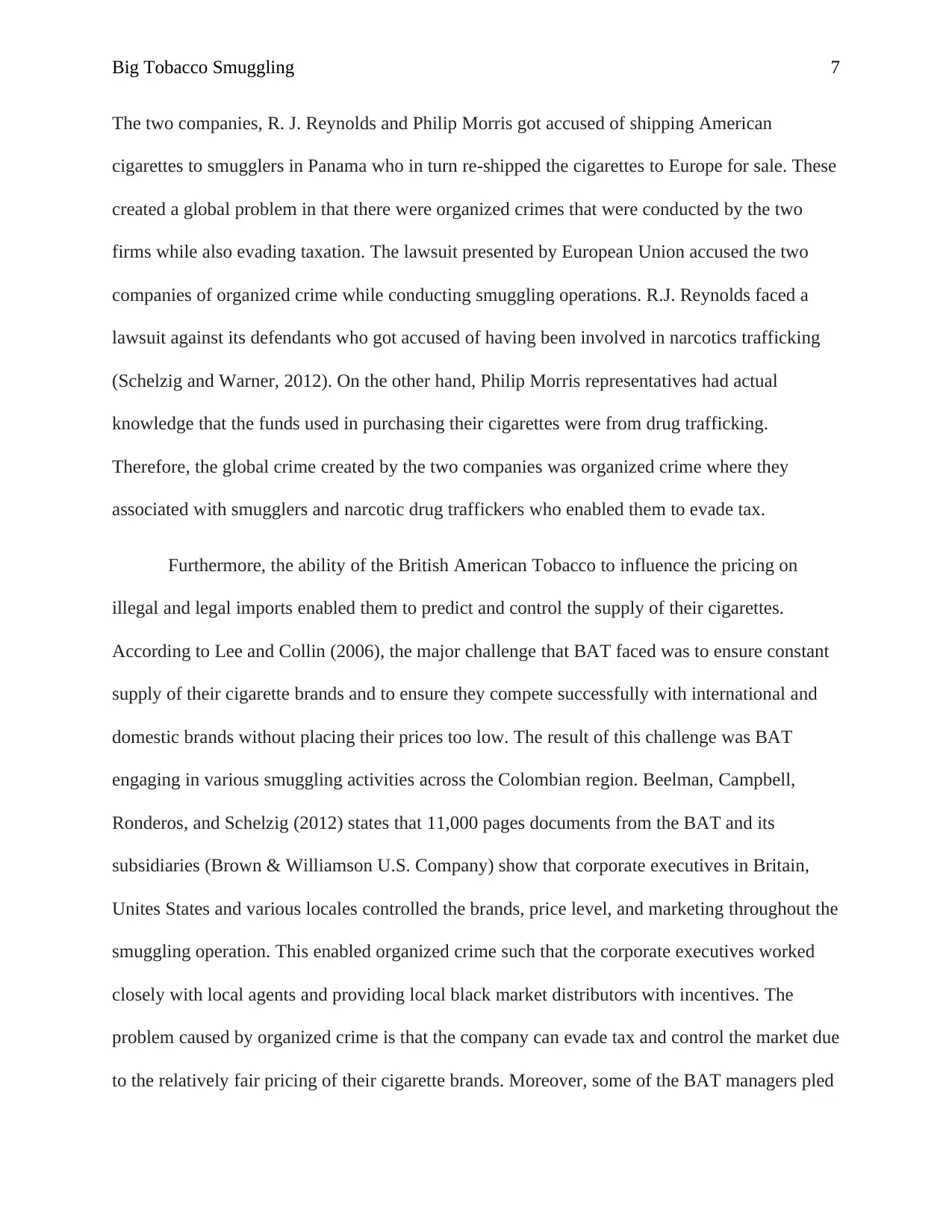
Big Tobacco Smuggling 7
The two companies, R. J. Reynolds and Philip Morris got accused of shipping American
cigarettes to smugglers in Panama who in turn re-shipped the cigarettes to Europe for sale. These
created a global problem in that there were organized crimes that were conducted by the two
firms while also evading taxation. The lawsuit presented by European Union accused the two
companies of organized crime while conducting smuggling operations. R.J. Reynolds faced a
lawsuit against its defendants who got accused of having been involved in narcotics trafficking
(Schelzig and Warner, 2012). On the other hand, Philip Morris representatives had actual
knowledge that the funds used in purchasing their cigarettes were from drug trafficking.
Therefore, the global crime created by the two companies was organized crime where they
associated with smugglers and narcotic drug traffickers who enabled them to evade tax.
Furthermore, the ability of the British American Tobacco to influence the pricing on
illegal and legal imports enabled them to predict and control the supply of their cigarettes.
According to Lee and Collin (2006), the major challenge that BAT faced was to ensure constant
supply of their cigarette brands and to ensure they compete successfully with international and
domestic brands without placing their prices too low. The result of this challenge was BAT
engaging in various smuggling activities across the Colombian region. Beelman, Campbell,
Ronderos, and Schelzig (2012) states that 11,000 pages documents from the BAT and its
subsidiaries (Brown & Williamson U.S. Company) show that corporate executives in Britain,
Unites States and various locales controlled the brands, price level, and marketing throughout the
smuggling operation. This enabled organized crime such that the corporate executives worked
closely with local agents and providing local black market distributors with incentives. The
problem caused by organized crime is that the company can evade tax and control the market due
to the relatively fair pricing of their cigarette brands. Moreover, some of the BAT managers pled
The two companies, R. J. Reynolds and Philip Morris got accused of shipping American
cigarettes to smugglers in Panama who in turn re-shipped the cigarettes to Europe for sale. These
created a global problem in that there were organized crimes that were conducted by the two
firms while also evading taxation. The lawsuit presented by European Union accused the two
companies of organized crime while conducting smuggling operations. R.J. Reynolds faced a
lawsuit against its defendants who got accused of having been involved in narcotics trafficking
(Schelzig and Warner, 2012). On the other hand, Philip Morris representatives had actual
knowledge that the funds used in purchasing their cigarettes were from drug trafficking.
Therefore, the global crime created by the two companies was organized crime where they
associated with smugglers and narcotic drug traffickers who enabled them to evade tax.
Furthermore, the ability of the British American Tobacco to influence the pricing on
illegal and legal imports enabled them to predict and control the supply of their cigarettes.
According to Lee and Collin (2006), the major challenge that BAT faced was to ensure constant
supply of their cigarette brands and to ensure they compete successfully with international and
domestic brands without placing their prices too low. The result of this challenge was BAT
engaging in various smuggling activities across the Colombian region. Beelman, Campbell,
Ronderos, and Schelzig (2012) states that 11,000 pages documents from the BAT and its
subsidiaries (Brown & Williamson U.S. Company) show that corporate executives in Britain,
Unites States and various locales controlled the brands, price level, and marketing throughout the
smuggling operation. This enabled organized crime such that the corporate executives worked
closely with local agents and providing local black market distributors with incentives. The
problem caused by organized crime is that the company can evade tax and control the market due
to the relatively fair pricing of their cigarette brands. Moreover, some of the BAT managers pled
Paraphrase This Document
Need a fresh take? Get an instant paraphrase of this document with our AI Paraphraser
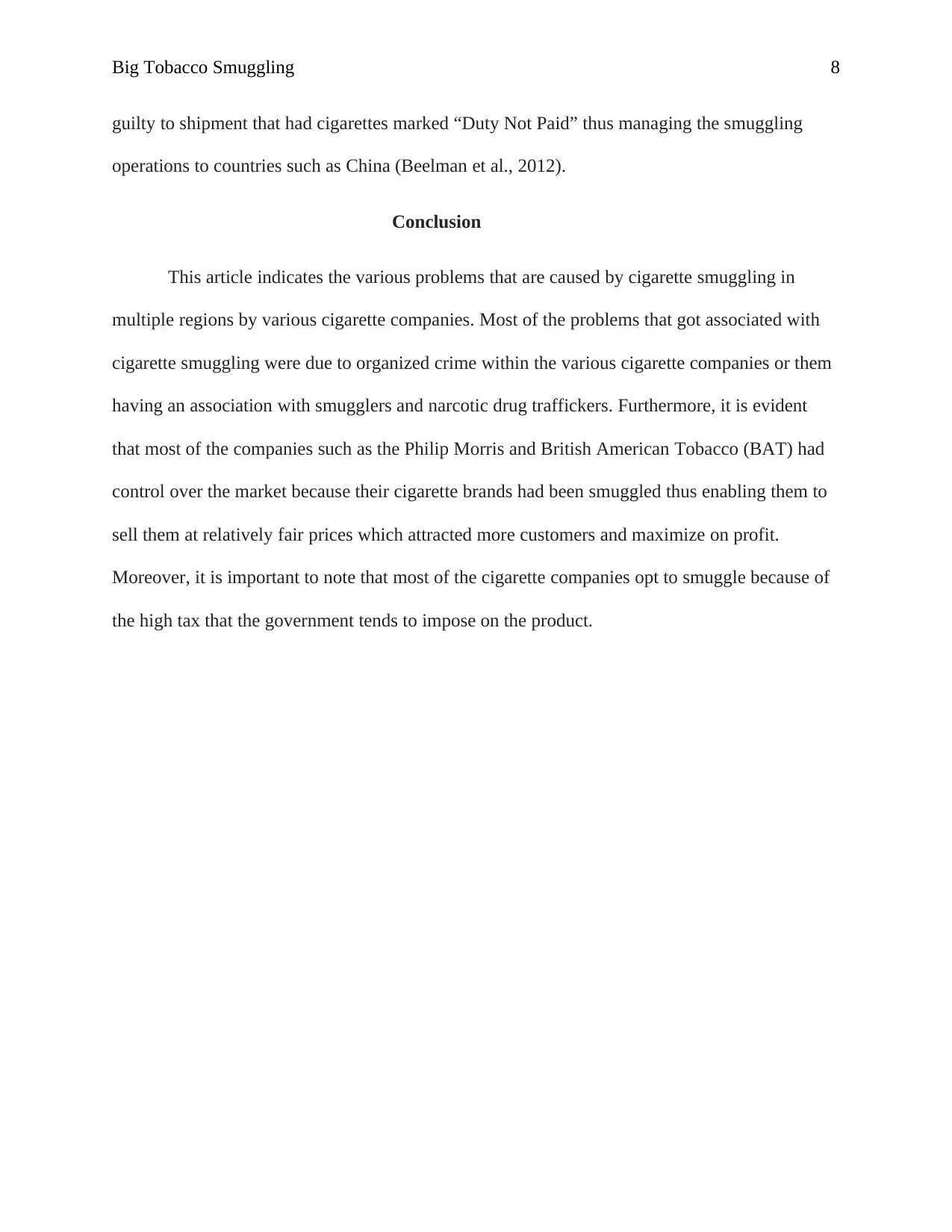
Big Tobacco Smuggling 8
guilty to shipment that had cigarettes marked “Duty Not Paid” thus managing the smuggling
operations to countries such as China (Beelman et al., 2012).
Conclusion
This article indicates the various problems that are caused by cigarette smuggling in
multiple regions by various cigarette companies. Most of the problems that got associated with
cigarette smuggling were due to organized crime within the various cigarette companies or them
having an association with smugglers and narcotic drug traffickers. Furthermore, it is evident
that most of the companies such as the Philip Morris and British American Tobacco (BAT) had
control over the market because their cigarette brands had been smuggled thus enabling them to
sell them at relatively fair prices which attracted more customers and maximize on profit.
Moreover, it is important to note that most of the cigarette companies opt to smuggle because of
the high tax that the government tends to impose on the product.
guilty to shipment that had cigarettes marked “Duty Not Paid” thus managing the smuggling
operations to countries such as China (Beelman et al., 2012).
Conclusion
This article indicates the various problems that are caused by cigarette smuggling in
multiple regions by various cigarette companies. Most of the problems that got associated with
cigarette smuggling were due to organized crime within the various cigarette companies or them
having an association with smugglers and narcotic drug traffickers. Furthermore, it is evident
that most of the companies such as the Philip Morris and British American Tobacco (BAT) had
control over the market because their cigarette brands had been smuggled thus enabling them to
sell them at relatively fair prices which attracted more customers and maximize on profit.
Moreover, it is important to note that most of the cigarette companies opt to smuggle because of
the high tax that the government tends to impose on the product.
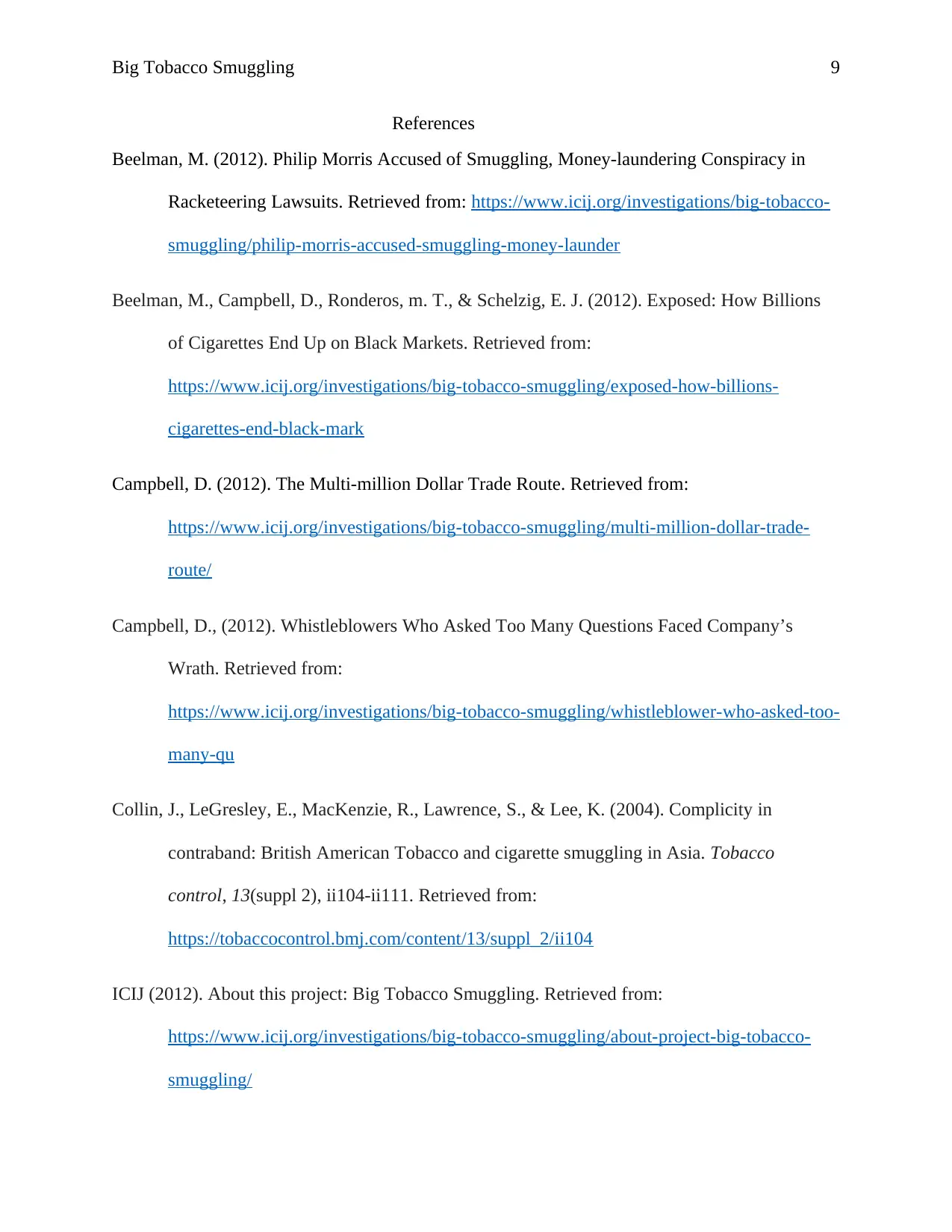
Big Tobacco Smuggling 9
References
Beelman, M. (2012). Philip Morris Accused of Smuggling, Money-laundering Conspiracy in
Racketeering Lawsuits. Retrieved from: https://www.icij.org/investigations/big-tobacco-
smuggling/philip-morris-accused-smuggling-money-launder
Beelman, M., Campbell, D., Ronderos, m. T., & Schelzig, E. J. (2012). Exposed: How Billions
of Cigarettes End Up on Black Markets. Retrieved from:
https://www.icij.org/investigations/big-tobacco-smuggling/exposed-how-billions-
cigarettes-end-black-mark
Campbell, D. (2012). The Multi-million Dollar Trade Route. Retrieved from:
https://www.icij.org/investigations/big-tobacco-smuggling/multi-million-dollar-trade-
route/
Campbell, D., (2012). Whistleblowers Who Asked Too Many Questions Faced Company’s
Wrath. Retrieved from:
https://www.icij.org/investigations/big-tobacco-smuggling/whistleblower-who-asked-too-
many-qu
Collin, J., LeGresley, E., MacKenzie, R., Lawrence, S., & Lee, K. (2004). Complicity in
contraband: British American Tobacco and cigarette smuggling in Asia. Tobacco
control, 13(suppl 2), ii104-ii111. Retrieved from:
https://tobaccocontrol.bmj.com/content/13/suppl_2/ii104
ICIJ (2012). About this project: Big Tobacco Smuggling. Retrieved from:
https://www.icij.org/investigations/big-tobacco-smuggling/about-project-big-tobacco-
smuggling/
References
Beelman, M. (2012). Philip Morris Accused of Smuggling, Money-laundering Conspiracy in
Racketeering Lawsuits. Retrieved from: https://www.icij.org/investigations/big-tobacco-
smuggling/philip-morris-accused-smuggling-money-launder
Beelman, M., Campbell, D., Ronderos, m. T., & Schelzig, E. J. (2012). Exposed: How Billions
of Cigarettes End Up on Black Markets. Retrieved from:
https://www.icij.org/investigations/big-tobacco-smuggling/exposed-how-billions-
cigarettes-end-black-mark
Campbell, D. (2012). The Multi-million Dollar Trade Route. Retrieved from:
https://www.icij.org/investigations/big-tobacco-smuggling/multi-million-dollar-trade-
route/
Campbell, D., (2012). Whistleblowers Who Asked Too Many Questions Faced Company’s
Wrath. Retrieved from:
https://www.icij.org/investigations/big-tobacco-smuggling/whistleblower-who-asked-too-
many-qu
Collin, J., LeGresley, E., MacKenzie, R., Lawrence, S., & Lee, K. (2004). Complicity in
contraband: British American Tobacco and cigarette smuggling in Asia. Tobacco
control, 13(suppl 2), ii104-ii111. Retrieved from:
https://tobaccocontrol.bmj.com/content/13/suppl_2/ii104
ICIJ (2012). About this project: Big Tobacco Smuggling. Retrieved from:
https://www.icij.org/investigations/big-tobacco-smuggling/about-project-big-tobacco-
smuggling/
⊘ This is a preview!⊘
Do you want full access?
Subscribe today to unlock all pages.

Trusted by 1+ million students worldwide
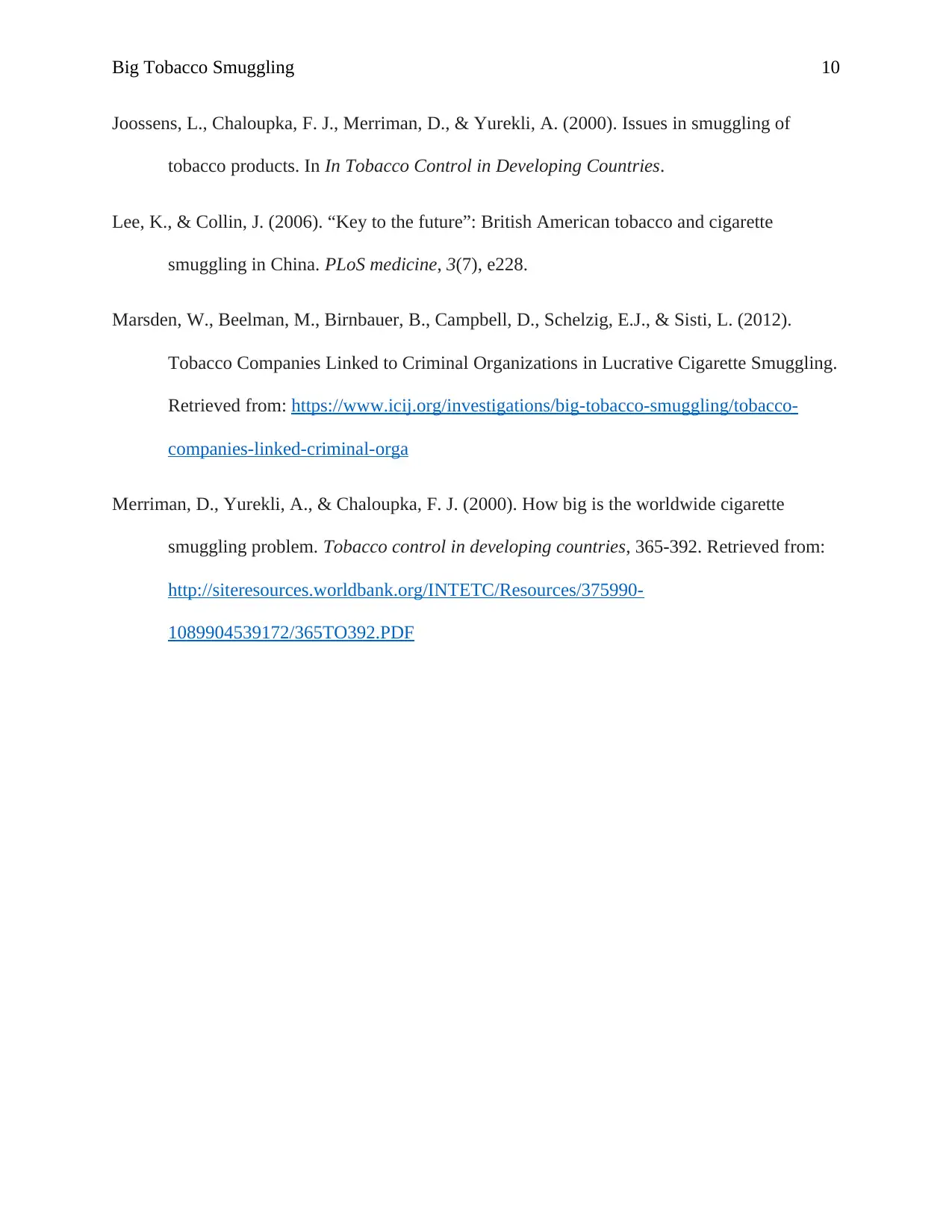
Big Tobacco Smuggling 10
Joossens, L., Chaloupka, F. J., Merriman, D., & Yurekli, A. (2000). Issues in smuggling of
tobacco products. In In Tobacco Control in Developing Countries.
Lee, K., & Collin, J. (2006). “Key to the future”: British American tobacco and cigarette
smuggling in China. PLoS medicine, 3(7), e228.
Marsden, W., Beelman, M., Birnbauer, B., Campbell, D., Schelzig, E.J., & Sisti, L. (2012).
Tobacco Companies Linked to Criminal Organizations in Lucrative Cigarette Smuggling.
Retrieved from: https://www.icij.org/investigations/big-tobacco-smuggling/tobacco-
companies-linked-criminal-orga
Merriman, D., Yurekli, A., & Chaloupka, F. J. (2000). How big is the worldwide cigarette
smuggling problem. Tobacco control in developing countries, 365-392. Retrieved from:
http://siteresources.worldbank.org/INTETC/Resources/375990-
1089904539172/365TO392.PDF
Joossens, L., Chaloupka, F. J., Merriman, D., & Yurekli, A. (2000). Issues in smuggling of
tobacco products. In In Tobacco Control in Developing Countries.
Lee, K., & Collin, J. (2006). “Key to the future”: British American tobacco and cigarette
smuggling in China. PLoS medicine, 3(7), e228.
Marsden, W., Beelman, M., Birnbauer, B., Campbell, D., Schelzig, E.J., & Sisti, L. (2012).
Tobacco Companies Linked to Criminal Organizations in Lucrative Cigarette Smuggling.
Retrieved from: https://www.icij.org/investigations/big-tobacco-smuggling/tobacco-
companies-linked-criminal-orga
Merriman, D., Yurekli, A., & Chaloupka, F. J. (2000). How big is the worldwide cigarette
smuggling problem. Tobacco control in developing countries, 365-392. Retrieved from:
http://siteresources.worldbank.org/INTETC/Resources/375990-
1089904539172/365TO392.PDF
1 out of 10
Your All-in-One AI-Powered Toolkit for Academic Success.
+13062052269
info@desklib.com
Available 24*7 on WhatsApp / Email
![[object Object]](/_next/static/media/star-bottom.7253800d.svg)
Unlock your academic potential
© 2024 | Zucol Services PVT LTD | All rights reserved.